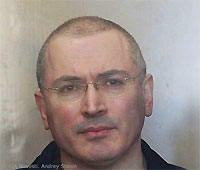Interfax: Evidence collection for third Yukos case started directly after 2nd conviction – source

MOSCOW. Dec 18 (Interfax) – Investigative procedures in the so-called “third Yukos case” started two weeks after the second sentence was handed down on former Yukos CEO Mikhail Khodorkovsky.
“Two weeks after Khodorkovsky and former top manager Platon Lebedev were sentenced, i.e. in the beginning of 2011, the police started to collect evidence for the third case,” a source familiar with the situation told Interfax.
“Searches and impoundments of documents started at banks and various companies at that time,” the source said.
Assets and accounts, which looked suspicious to the police, were seized. “The investigation intensified in February 2013 and new searches and interviews were conducted,” the source said.
Interfax has not obtained official confirmation to this information.
Russian Deputy Prosecutor General Alexander Zyagintsev told Interfax in an interview in December about the investigation of new cases related to the former Yukos CEO and noted that the cases “had good prospects in court.”
As to whether the former Yukos CEO might be eligible for the upcoming amnesty, the deputy prosecutor general said, “As you know, Khodorkovsky was convicted and is serving time by a court order for very serious crimes perpetrated by an organized group. Draw your conclusions. This question is not for me [to answer].”
A source familiar with the situation told Interfax later that laundering of the money misappropriated by Yukos executives was being investigated in the third Yukos case.
“It is the question of an inquiry into laundering (legalization) abroad of more than $10 billion misappropriated by M. Khodorkovsky and other persons,” the source said.
Detectives are also looking into the possible use of the laundered money for the purposes of alteration of Russian laws, he added.
Khodorkovsky and former Menatep Group head Platon Lebedev were arrested in 2003 and sentenced to nine years in May 2005 on the fraud and tax evasion counts. The Moscow City Court later reduced their sentences to eight years.
A second criminal case was opened against Khodorkovsky and Lebedev when their first trial was nearing completion. The former Yukos executives were sentenced in December 2010 to 14 years for crude embezzlement and money laundering. Six months later the Moscow City Court reduced their sentences to 13 years.
The prison term was calculated from 2003, since the day of their arrest in the first Yukos case.
The Supreme Court partially upheld the appeal of the defense team of Khodorkovsky and Lebedev on August 6, 2012, and cut their sentences by two months. The Supreme Court refused to reduce their prison terms to what they had already served and to release them from custody. The adjusted prison time will expire in August 2014 for Khodorkovsky and May 2014 for Lebedev.
